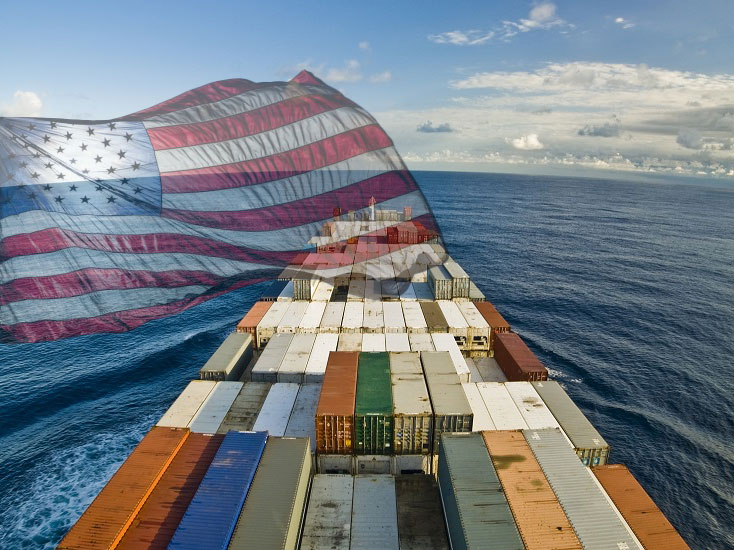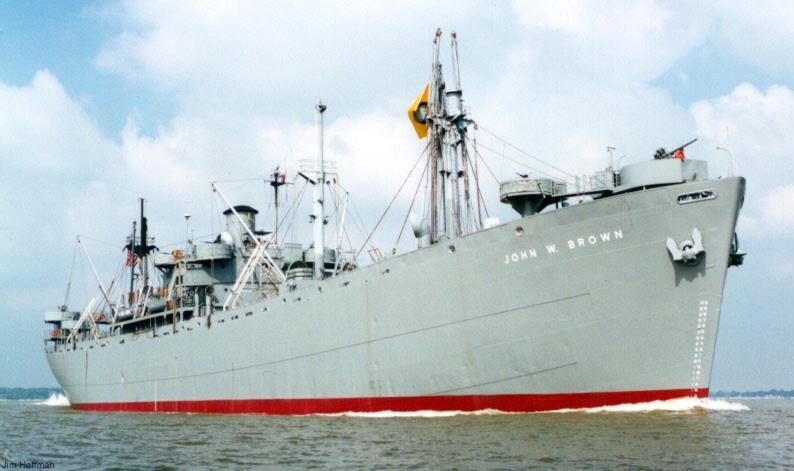The USA realizes that it no longer has a merchant navy and runs for cover

The U.S. commercial shipping industry has long been in decline, to the point of being on the verge of disappearing.
From 1953 to 2016, the number of shipyards capable of building large military and commercial vessels fell from 30 to six, and their annual production fell from 60 to seven, according to an analysis of U.S. naval records. In the event of a crisis, the USA would find itself without production capacity.
Now Navy Secretary Carlos Del Toro is sounding the alarm, warning that the Navy will not be able to fulfill its mission without a strong commercial counterpart.
A thriving maritime industry means having more trained builders and maintainers that the Navy could draw on in a crisis; a greater number of dry docks and construction facilities that the service could exploit; greater investments in innovative tools, technologies and processes to build ships more quickly and economically. Furthermore, having a strong commercial fleet means having a naval force to rely on in case of emergency. China has the “Maritime Militia” for this purpose, but Western countries have long since had anything similar.
Del Toro wants to make this maritime trade possibility a reality through an emerging initiative he calls “ Maritime statecraft.”
He presented the idea in a September speech at Harvard University, saying it “includes not just naval diplomacy, but a national, whole-of-government effort to build global maritime power of the United States and allies, both commercial and naval".
Let's give a dimension of the total US disarmament in the sector: according to 2022 CIA estimates, China has 7,362 merchant ships, i.e. commercial ships engaged in the transport of goods. The United States has 178. The US merchant marine practically does not exist, yet it was the "Liberty ships", the merchant ships, that supported the US military effort in Europe and Asia. The US at the time built 2,710 Liberty Ships between 1941 and 1945.
In the event of war, the United States could call into service 60 American merchant ships through the Maritime Security Program, to supplement the approximately 100 government-owned merchant ships that have been laid up but could return to service. They would help transport military vehicles and materials to a theater, but it would be very little compared to what, for example, China could do.
According to Del Toro, the United States can no longer afford this imbalance.
Rebuilding US shipbuilding
After decades in which fewer shipyards built fewer ships, America's shipping industry needs to be revitalized and modernized, Del Toro said. To achieve this goal, del Toro said he is working with his counterparts across the government to identify what the shipping industry needs and how the government can help.
In mid-November, it convened a meeting with several other entities at the first Government Shipbuilders Council in Baltimore, Maryland. Participants included the Army, Office of the Secretary of Defense, Coast Guard, Maritime Administration, and National Oceanic and Atmospheric Administration.
Days before the meeting, del Toro said he hoped it was the start of a "conversation about a global government vision for maritime statecraft."
For example, he explained, the Maritime Administration successfully partnered with the Philadelphia Naval Shipyard to deliver the first multi-mission Homeland Security ship on time and on budget in September.
Del Toro said other government agencies could take advantage of this program.
He also pointed to a tool that has gone unused since the Reagan administration: “differential construction subsidies” to incentivize private companies to buy ships from American builders rather than cheaper foreign yards.
This provision of Title 46 of the United States Code, which allows the government to pay up to half the cost difference, has not received funding since the early 1980s. But Del Toro said he and the secretary of the Department of Transportation still have the authority to award these grants, as long as he and the secretary of Homeland Security certify that there is a national security need for a ship.
“Initial funding, for example, for a single vessel – even if phased over several years, since accounts can be funded indefinitely – would send a strong signal to shipbuilders that the program is being revived,” he said Del Toro, without however specifying if and how this could be included in the budget for the fiscal year 2025.
The need for private capital
Del Toro encouraged private investors to invest in small and medium-sized shipyards and their suppliers. The minister contacted several private operators and found some success.
He is also seeking foreign investment in small- and medium-sized U.S. shipyards. As examples, he cited Australia's Austal's purchase of the Austal USA shipyard in Alabama in 1999 and Italy's Fincantieri's purchase of the Fincantieri Marinette Marine shipyard in Wisconsin in 2009.
“We are still fully committed to complying with the Jones Act,” which requires American-built, owned and operated ships to move cargo between American ports, he said. “But having said that, I believe that, with the continued expansion of the commercial and naval market – especially the commercial market – there are opportunities to invest in some of our shipyards.”
Noting that Japan and South Korea have already purchased shipyards abroad, then modernized and automated them to a level far exceeding the capabilities of many American shipyards, Del Toro said that “encouraging them to make investments here could be a statement strong, if the business case allows it."
Harness renewed maritime power
U.S. leaders accused China of mounting a government effort to threaten its neighbors at sea, using the People's Liberation Army Navy, Coast Guard and its fleet of maritime militia fishing boats to harass foreign sailors who operate in their nations' exclusive economic zones while fishing, exploring the seabed for natural resources, and drilling for oil and gas.
Del Toro said the United States must be able to respond and help allies and partners address geopolitical, economic and climate challenges. He cited a 2020 incident in which Chinese vessels harassed a West Capella drilling vessel chartered by Malaysian state energy company Petronas to explore underwater oil and gas reserves.
After forces from the US Navy, US Marine Corps and Royal Australian Navy “maintained a persistent presence in strong support of a partner's sovereign and internationally recognized rights, China backed down,” he added.
To wield this increased naval power, Del Toro said the U.S. Coast Guard needs a larger budget for more ships and operations, particularly in the Pacific. The Navy's Military Sealift Command and the Department of Transportation's Maritime Administration will also play an increasingly important role in naval diplomacy and maritime statecraft.
Domestically, he said, the Navy is focusing on closing gaps in its ability to operate and sustain itself overseas. He stressed that the US Navy wants to increase the ability of Navy tankers to refuel from commercial tankers at sea, instead of returning to a fuel depot on land. This would increase the need to collaborate with the merchant navy on a procedural and design level, but then the measure could also help the development of new refueling methods for commercial ships.
Additionally, he expects the Navy to demonstrate its ability to recharge Vertical Launch System cells at sea next year, with a shore demonstration in the spring in Port Hueneme, California, followed by an at-sea demonstration in the summer.
Del Toro called this type of naval logistics "fundamental" to the fleet's ability to remain at sea in contested waters and conduct maritime statecraft missions.
However, all this has a problem: at the moment the necessary appropriations are lacking: the measures suggested by Del Toro are interesting, but the coffers behind them are empty. But the parties in parliament are negotiating and it is not impossible that, since it is a national production, something could emerge in the end.
And what about European countries? They are too busy with dreams of decarbonization to evaluate the strategic weight of shipbuilding. One day we will find ourselves in serious trouble in some strategic context and we will regret our current choices.

Thanks to our Telegram channel you can stay updated on the publication of new Economic Scenarios articles.
The article The USA realizes that it no longer has a merchant navy and runs for cover comes from Economic Scenarios .
This is a machine translation of a post published on Scenari Economici at the URL https://scenarieconomici.it/gli-usa-si-accorgono-di-non-avere-piu-una-marina-mercantile-e-corrono-ai-ripari/ on Wed, 13 Dec 2023 12:43:57 +0000.


